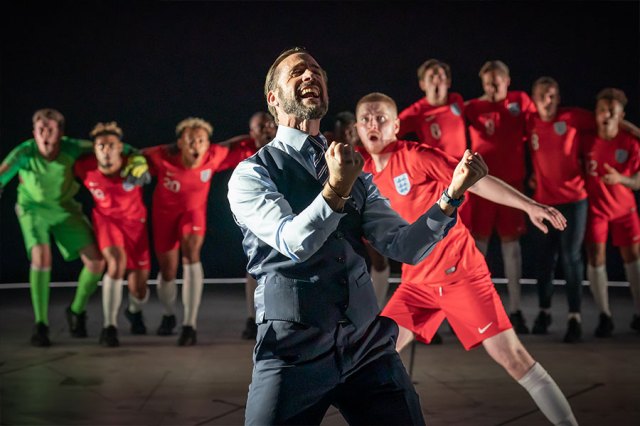Dear England at the National Theatre review – the beautiful game in a beautiful play
James Graham’s football-themed play is currently on stage at the National Theatre

The thing about sport is that it is always about something bigger than itself. And the thing about football in England is that it is nearly always about our national identity: the success or failure of the English team carries far more weight than the simple act of 11 young men or women kicking a ball around a pitch has any right to bear.
It’s a perfect subject for playwright James Graham, whose plays – varied though they are – are all examinations of who we are and what we believe in. In his hands, aided and abetted by the vigorous direction by Rupert Goold, this story of Gareth Southgate’s vision for the England men’s football team is an absolute blast, a riot of exuberant theatre that is as exciting as Marcus Rashford scoring a hat-trick.
It’s a thrilling piece that you hope might just convince theatre fans of the importance of football, and football fans will see to understand just how exciting theatre can be.
Dear England takes its title from the letter Southgate wrote to the nation mid-pandemic in 2021 and uses the history of Southgate’s journey as England manager as a way of exploring what really is of value in the sport so many people love. It contrasts the unity of spirit and endeavour that he manages to create in the team, with the fractured world around it, offering a kind of tentative hopefulness to cling to.
It begins, on Es Devlin’s spare set, circled with great halos of light by Jon Clark, and with evocative videos by Ash J Woodward, under the two arches of the old Wembley when Southgate looks back at the defining moment of his life – the day he missed a penalty which meant England lost to Germany in the 1996 Euros semi-final.
The fear of the penalty is the thread that binds the play together. Southgate, played with a permanent air of kindly anxiety by Joseph Fiennes, is so determined to banish his demons – “I knew I was responsible for ending millions of people’s dreams” – that he recruits psychologist Pippa Grange (a gentle Gina McKee) to transform the culture around the English team in the belief that freeing his team from expectation will transform their chances of actually winning.
Events unfold at a frenetic, cartoon-like pace, beautifully choreographed by Ellen Kane and Hannes Langolf. The players rush around the stage in bright sportswear, moving swiftly through scenes of stylised action. Politicians appear in a fleeting moments and in broad outline – Theresa May in tight suit, Boris in a mad wig. So do previous English football managers such as Sven Göran Erikksen and Graham Taylor. In a cast that are often tripling parts, there’s only a moment for figures such as Gary Lineker (Gunnar Cauthery) to make their mark.
But they are instantly recognisable and often supremely funny. John Hodgkinson, in particular, has great fun with the FA’s sceptical and tactless Greg Clarke and FIFA’s Gianni Infantino. The footballers themselves stay in character, and though Graham skirts close to caricature, his affection and admiration for them is clear: Will Close’s inarticulate Harry Kane is, by the close, probably the most lovable character on stage.
What the production has in abundance is both energy and tenderness. It is full, in fact, of exactly the same qualities that created Southgate’s ethos – of compassion, of inclusion, of a willingness to recognise that winning isn’t everything, that respect and love for one’s teammates are also qualities worth striving for.
It’s not a hagiography. Graham is clear-eyed about the brutality of the choices and burdens of professional sport, and he doesn’t exempt Southgate from criticism. Occasionally the writing gets bogged down in incident – the woman next to me was confused by the details of the ban on OneLove armbands in Qatar – and in its own metaphors.
But as a drama, it is utterly absorbing, full of twists and turns, vivid characters, proper conflicts, and great lines. If you’re not a football fan you might not appreciate every beat, but I suspect you will find it impossible not to be swept away by its sheer panache and invigorated by its message. And if you love football, as I do, you’ll be left full of admiration for the way Graham has created another powerful epic for our times. He shoots, he scores! Again.














